Tuesday, May 31, 2005
An open thread...
I have some old comments that I didn't reply to. I suppose I'll have to leave a note of update here if I do.
Monday, May 30, 2005
Martians, ID and Evolution
Many, many people in the first half of the twentieth century were almost certain Martians were there based on science, based on notions drawn from both Evolution and Intelligent Design, oddly enough. Many assumed that as life will almost inevitably evolve if given a chance to do so as per the premises of Evolution it would therefore evolve or have evolved on planets besides Earth. The increasing amounts of evidence that Earth is a quite a privileged planet is coming to be evidence against such notions. On the ID side, there was this fellow named Percival Lowell who thought that some lines seen by astronomers on the surface of Mars were canals and therefore Mars was civilized. It was false evidence for Design as the lines that were seen were an artifact of poor telescopes, as I recall. I would note that if lines of a mathematical type of order were actually there, it probably would be valid to argue that as empirical evidence for a Martian civilization. The problem was that the empirical evidence the claim was being based on was not valid, not that such a claim is inherently invalid.
People used to take such notions very seriously with respect to Mars...and not just in the comical comic books:
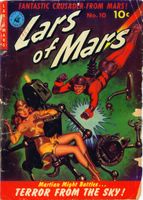
Instead, the ideas used for narratives in the comics were taken seriously as narratives in general:
PARIS, Feb. 21--Edmond Perrier, Director of the French Botanical Society, in an amusing interview, declares that there can be no doubt at all that there are plants and flowers on Mars, and that the planet is inhabited. He has published a little pamphlet in which he describes, on scientific grounds, the Martians as he believes them to be.
Owing, he says, to the lightness of the atmosphere on Mars and the comparative absencse of fierce light, vegetation is luxuriant and the Martians are probably people like the giant Scandinavians. They are, he thinks, about twice the size of human beings, and have enormous noses and large protruding eyes.
....
Camille Flammarion, the famous astronomer, was interviewed on the subject today. He refuswes to follow M. Perrier in his more imaginative flights, but says he is conviced, after watching Mars closely for forty years, that there is no reason against Mars being inhabited, and says M. Perrier is probably right in what he says of its luxuriant vegetation.
(What Martians Are Like
By Marconi Transatlantic Wireless Telegraph
to the New York Times; Feb 22, 1912 pg. 4)

One sensational incident that many people have heard of as far as how seriously these ideas were taken was the War of the Worlds:
Ever since Professor Percival Lowell in the Nineties discovered the 'canals' on Mars, and other celestial observers caught signs of atmosophere and clouds, the world has been looking for messages from the ruddy faced neighbor...
[...]
The fantastic, but realistically sounding 'gas raid from Mars' adapted for broadcasting from H.G. Wells's story, 'War of the Worlds,' written in 1897, just when Lowell was seeing the 'canals' and Marconi was stirring up the ether, sent an unprecedented wave of public hysteria across the country last Sunday night. It has been a topic of conversation in and out of radio circles ever since.
[...]
....in adapting the play, error No. 2 occurred when the names of New Jersey towns were used instead of foreign places mentioned in the H.G. Wells story. Such names brought the play all too close to home to sound like fantasy. Then, too, the listeners were in the mood to believe it could happen here. Americans had heard enough of European short-wave broadcasts and rebroadcasts in recent weeks ot realize that such catastrophes do happen and happen quickly. They had eavesdropped on commentators in London, Prague and Paris talking about just such a terrible event; they had seen pictures from overseas of women and children being fitted with gas masks. The radio 'news flash' sounded real.
And well it might when an announcer broadcasts such a statement as follows, and the ear catches only this much from the night air: 'Now, nearer home, comes a special announcement from Trenton, N.J. It is reported that at 8:50 p.m., a huge flaming object believed to be a meteorite, fell on a farm in the neighborhood of Grovers Mill, N.J., twenty-two miles from Trenton. The flash in the sky was visible within a radius of several hundred miles and the noise of the impact was heard as far north as Elizabeth.'
Error No. 3...was the use of the titles of Federal, State and city officials. For instance, it was broadcast that the 'Secretary of the Interior' had ordered the evacuation of a certain area in New Jersey; that the Governor had placed parts of Mercer and Middlesex Counties under martial law. Hence, one listener said, 'That scared me to death; I thought for sure then it was the real McCoy. I rushed into the street and found neighbors running in all directions.'
[...]
(Message From Mars
By Orrine E. Dunlap Jr.
The New York Times; Nov. 6, 1938 pg. 184)

Yet, it was repeated:
('Martian Invasion' Terrorizes Chile
By The Associated Press
The New York Times; Nov. 14, 1944 pg. 1)

And for a number of years ideas about the planet Mars, the planet of the god of war received similar treatment, example:
(Fair 'Arms' Against Mars
The New York Times; Jul. 27, 1939 pg. 13)

It was a pretty strong meme in its day. And the UFO types are still around demonstrating the continuing strength of these notions. People forget that scientists thought it very likely that they would find life on Mars until quite recently, given assumptions based on the mythological narratives of Naturalism and how a primordial mud puddle can supposedly be the common ancestor of all Life on a planet.
________
A side note,
It is possible that there is only one privileged planet that sits rather near the center of the Cosmos, just so, with quite a good view of the same. That may be so that those who have eyes, may see. Perhaps it is the remnants of what once would have been a Garden for creating and nurturing Life. There are stories of gardens within the garden, one called Eden, another called Gethsemane and another in which an empty tomb was found.
"I am the true vine, and my Father is the gardener."
John 15
A story about a garden:
The Garden, I
The Garden, II
The Garden, III
The Garden, IV
The Garden, V
The Garden, VI
Windsurfing...
Wednesday, May 25, 2005
...there be dragons...

...some will reject all ancient evidence written or recorded by humans and believe the mythological narratives of Naturalism written by half-wits, those missing about half of all wit/knowledge. Those narratives of Naturalism are often based on some scientists digging up rocks from the ground and looking at them, myopically. As they lose their perspective just as their professor taught them to, perhaps their glasses get thicker, then thicker. Perhaps then a scientist says, "You know, from what I have seen...all life probably came from these rocks dissolving in an ancient mud puddle." There is the narrative. Then all the half-wit science thumpers murmur, "Science...yes, why, the science of that!"
Yet sometimes the empirical evidence indicates that ancient humans might not have been a bunch of primitives that were closer to the legendary Ape-man of the mythological narratives of Naturalism. The first Amazon review on the finger prints of the gods notes, "The truth is, when the evidence presented by archaeologists, egyptologists, and other professionals is examined critically, the traditional school is very far from convincing. ...It means that when we cannot build a replica of the Great Pyramid today, with our technology (the Japanese tried and failed, and theirs was a far smaller "scale" replica), but are expected to believe that copper-tools wielding Egyptians could (2.3 million blocks of stone; weights going from 1.5 tons to 15 and 17 tons; "killer" slope of 52 degrees; near perfect alignement; perfect 90-degree corners; perfectly cut diorite blocks, and so on), then is when inquisitive, intelligent people wonder, How is that possible?"
He argues, "This does not mean that the general public is ignorant or gullible."
Oh, I think it probably does!
Those are a few but not all of the mysteries of the Great Pyramid and other accomplishments like it. Naturalism and its smothering dogma of "scientific fact" along with the narratives it generates on origins is a failure. It is more of a failure when it comes to origins than the average person looking at a shrine to "primitive" Ape-man in the Smithsonian is allowed to know. So they are not allowed to know. Instead, they must be forced to be half-wits too.
Rousseau's Noble Savage

Lest the feminine feel a little left out, woman can be a noble savage too:

Rousseau finds some nobility in Ape-man, yet Nietzsche replies:
"What is the ape to man? A laughing-stock, a thing of shame. And just the same shall man be to the Superman: a laughing-stock, a thing of shame.
Ye have made your way from the worm to man, and much within you is still worm. Once were ye apes, and even yet man is more of an ape than any of the apes.
Even the wisest among you is only a disharmony and hybrid of plant and phantom. But do I bid you become phantoms or plants?
Lo, I teach you the Superman!"
--Zarathustra, in Thus Spake Zarathustra
by Friedrich Nietzsche, professed prophet of the Anti-Christ
Tuesday, May 24, 2005
Zingers....
The first wrote something and then said that they looked forward to some more zingers back. The second engaged in a little dialogue and then said that they appreciated the barbs. For as iron sharpens iron so one man sharpens another and so on, as the irony of it all continues. The last wrote asking if I have a zinger they had not seen yet. But perhaps they cannot see any way, as the Naturalist's mind seems to be folded in on itself just a bit so that its bytes are few. It's the mind of the gaps that refuses to admit to itself what the Self is and cannot admit to the Mind of God either. It may quibble, yet it cannot admit to self-evident truths evident in the Self in an absolute way, which is the only way to admit to them. Instead, it will argue that God is just the "god of the gaps" and that Naturalism is inevitably filling all these supposed gaps in knowledge in. That is quite false in many ways, that sort of mind may as well fill in its own synaptic gaps so that it will not be a mind of the gaps anymore.
But back to the zingers that can fire through some gaps, they are quite necessary in intellectual war. Sometimes, what a mind needs is a zinger!
A study on rhetors, rhetoric and the crafting of zingers:
To Darwin’s skeptics, the coming of Michael Denton in 1985 produced the rhetorical analogue to the opening scenes of Saving Private Ryan. Darwinism had held the continent of scientific consensus for over a century. At last the time had come to wade ashore and establish the first beachheads of empirically based antievolutionism. The odds against the would-be “liberators” seemed so terrible as to border on the absurd. Everything hinged on the weapon held by the invaders—a 344 page book, Evolution: A Theory in Crisis, published in England (1985) and the United States (1986). The author was relatively unknown—a British-educated biochemist and medical doctor laboring in the obscurity of the clinical chemistry department of Prince of Wales Hospital in Sydney, Australia.(Doubts About Darwin: A History of Intelligent Design
As the invaders clambered up the cliffs towering over the beaches, they hurled Denton’s explosive charges toward the pillboxes: “Neither of the two fundamental axioms of Darwin’s macroevolutionary theory—the concept of the continuity of nature. . . and the belief that all the adaptive design of life has resulted from a blind random process—have been validated by one single empirical discovery or scientific advance since 1859” (italics mine). MIT’s Murray Eden with his Wistar colleague Schutzenberger joined the invading troops, announcing that Denton “should be required reading for anyone who believes what he was taught in college about Darwinian evolution.” Paul MacLean, a former professor at the Yale Medical School and founder of the Brain Evolution Lab at the National Institute of Mental Health, exulted, “Kant gave credit to Hume for arousing him from his ‘dogmatic slumber. This book promises to arouse an entire audience” (italics mine). Even the celebrated anthropologist Ashley Montagu praised Denton’s breadth of knowledge, noted his “just and telling” criticisms, and welcomed his “valuable contribution.”
The Darwinian defenders were not asleep. Rhetorical bullets flew in savage counterattack:“Denton’s book displays a vast ignorance about Darwin, evolution, and science in general.”A trio of prestigious evolutionists—Michael Ruse, Mark Ridley, and Niles Eldredge—wrote strongly negative reviews in prominent journals in an effort to crush Denton’s credibility and repel his attack. When the smoke cleared from the beach landings of 1985—86, the continent was still firmly in the hands of neo-Darwinism. Yet in the cliffs, here and there, certain pillboxes had fallen to the invaders, who were now spraying the countryside with sniper fire.
“A specimen of creationism at its most subtle and up-to-date.”
“No area escapes misrepresentation and distortion.”
“a sham”
“fraught with distortions”
I trust the reader will bear with my Normandy metaphors, which of course are my own attempt to capture the wave of projection themes that powerfully chained out in the budding consciousness of early proponents of design when Denton’s attack was published. The imagery fits well with Denton’s comment in a letter in early 1987 that exemplified the Normandy fantasy scene: “I am totally committed to waging unceasing intellectual war on neo-Darwinian orthodoxy.” Denton was blunt, thorough, confident, and cognitively upsetting for anyone who began his reading with the assumption that Darwinian theory rested on ample confirming evidence. In a word (Denton’s own word in the preface), the critique was radical—a notion I shall analyze later in the chapter.
It is impossible to trace the development of Design in the 1990s and beyond without reviewing the origin of that movement in the rhetorical invasion and bloody skirmishes that were triggered by Michael Denton in 1985. His Evolution: A Theory in Crisis (hereafter referred to as Evolution) is, to an astonishing degree, the initial impetus, inspiration, and even rationale of the movement. Together with The Mystery of Life’s Origin, a more technical critique focused on chemical evolution that preceded Evolution by a few months, Denton practically established the rhetorical matrix of values, communication styles, purposes, perspectives, assumptions, and beliefs that became the substance of the new Design genre. These books also supplied a fund of rhetorical resources—lines of argument, phraseology, and especially patterns of evidence and anomalies gathered from many different biological fields. All of these outfitted the invading marines of the incipient Design Movement as they strategized their next sorties.
By Thomas Woodward :47-49)
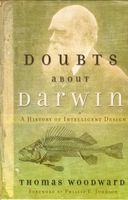
Zingers are good for sniping, yet I personally do not attempt to establish or maintain "credibility" and I have little to no ethos as a rhetor from an identity/image to base it on. It is good to lack an image, as then there is nothing there for an adversary to attack. Then there is no "who"/identity, only the "what"/argument to deal with. A similar pattern might be: Do not make a graven image to venerate so that you may look to the Word of God instead. The Word of God is what the Mind of God says and communication is the key, insight over sight. Yet then you may have sight through Jesus, as the Word became flesh.
This pattern has helped me out over time, as it creates a tendency to look to text, facts, history and philosophy instead of dealing with the inane personal politics of "credibility" all the time. (E.g. answering Mike's memes....science thumpers are all about personal "credibility." And that's about it for them.)
As Naturalists place the physical and worldly before the metaphysical and spiritual, their focus may shift to the physical person and away from text, logic and evidence naturally enough. By focusing on what is being written instead of who is writing it, I'm just helping Naturalists out of what Mommy Earth tends to select for her believers by her natural selections.
It seems that being helpful like that comes naturally to me.
Sunday, May 22, 2005
Miracles
"If I gave you another narrative with tools like a burning bush, a sea that divided conviently so a race of people could run through it, a digestivly discriminatory whale, frequented by people who often lived many hundreds of years, wouldn't you get a little suspicious?"
Ironically, all of those things are probably more likely than our common ancestor being a puddle of mud. They even have more likely naturalistic explanations, as some scholars have tried to reconcile them with Naturalism. Why have they tried to reconcile the narratives with Naturalism? It's because the Bible has often proven to be historically accurate over time. Therefore, scholars think that the ancient writer must have been describing some natural event, given Naturalism.
I would note that you think such relatively small things are miracles which are too hard to accept as such, yet the unlikely nature of your own brain with its 100 billion neurons could cause one to "get a little suspicious." Yet it doesn't because we experience it, even though it is many orders of magnitude more difficult to explain naturalistically than a burning bush. I keep pointing out the miracle of thinking through the brain and the like to get a divine foot in the door. There is an oft quoted evolutionist who said, "...we cannot allow a divine foot in the door!" So I do the opposite and try to get it in. Naturalism must be all encompassing in a stifling and smothering way, lest there be one single alternative explanation that undermines the whole explanatory orthodoxy. One event will undermine it, as then perhaps there just might be more too. You never seemed to answer if what you write here is nothing more than an artifact of your brain events or if instead, "you" have set matter in motion through your neural nets as an act of your mind. If you have not thought through your brain, then what seems like an eventful day of your brain events may be rather meaningless. But feel free to leave as many of the artifacts of your brain events around as you want to.
The same text that records the intervention of the Mind of God through Nature in the "miracles" is interesting.
It's mathematical. Every 49 letters in Genesis and Exodus spell "The Law of God" while every 49 letters of Deuteronomy and Numbers spell "The Law of God" backwards, inbetween these books is the book of Leviticus in which every seven letters spells Yaweh, the Hebrew name for God. Seven is the number of completeness, the seventh day is a day of rest and so on. That is what it is used to symbolize. In contrast, 666 is a trinity of incompleteness and so on. There is a genealogy in the Bible in which the number of words is evenly divisible by seven, the number of letters is as well, as well as the vowels and consonants, as well as the number of words that begin with a vowel, as well as those that begin with a consonant, while the number of names in it is evenly divisible by seven, as well as the number of generations, and so on and so forth. It seems like a lot of sevens are written into the genealogy of Jesus. This makes me a "little suspicious." Of course, the Naturalist believes that the author who knew the ancient symbolism just wrote it in again. And I suppose we are back to the brain events of writers and the like.
As long as we are discussing things that make me suspicious, the basic pattern of the Christian mythos and the way it almost invariably matches the basic archetypes and patterns of narratives that people write to this day makes me a little suspicious. It is as if it is in their psyche. It also matches other ancient narratives.
The evolutionist perspective of orthodox Naturalism is almost impossibly myopic when it comes to origins scholarship. Yet they will tell you their mythological narratives of Naturalism, seriously enough. Apparently it is only natural for them to do so. Actually, they typically refuse to write their mythological narratives of Naturalism on free forums and the like where they well know what would happen. But then, there the mythological narratives of Naturalism are on PBS or in the National Geographic, based on the myopic mental incompetency of Naturalism.
To get at the truth, instead of getting the latest naturalistic explanation, one has to open their mind. You have argued that most people need God because they need a security blanket. Yet it is Naturalism that covers over all things. Do I need or want to believe that there is a just God, whose justice cannot sleep forever? Do I want to believe that things I think with my mind or choose to do may have Cosmic significance? Given my natural desires I would rather have believed in mommy Nature and a blanky of Naturalism to wrap myself in securely. I would live as I pleased, naturally enough, and then would just rest in oblivion. Contrasted with what you have said, I think that admitting to anything spiritual or allowing a "...divine foot in the door..." causes insecurity, not security.
Friday, May 20, 2005
Intelligent Quotient?
"Your Intellectual Type is Visual Mathematician."
I suppose that means that I cannot solve 2+2=4 without seeing two little twos in my head....and then I visualize a little four too.
"This means you are gifted at spotting patterns — both in pictures and in numbers."
Pictures and numbers are patterns...they are in patterns and images but not of them. So you write a number and create something that has an image, yet its meaning is not of its own image. Its true meaning is to be found in the mind that set the matter in motion. It seems though, that the words of the most creative Creator may come to think that their meaning can be found in and of their own image. Then perhaps they wonder why everything seems quite meaningless.
"These talents combined with your overall high intelligence make you good at understanding the big picture, which is why people trust your instincts and turn to you for direction..."
That's odd, because when I turn to myself for direction my Self seems to feel, "Sheesh, don't ask me..."
Thursday, May 19, 2005
Evolutionists....
They also tend to argue that critics are making an argument from personal incredulity.
The argument that incredible claims need incredibile evidence is sound, there is nothing personal about it.
Wednesday, May 18, 2005
Uebermensch

"The superman is a premature ideal, one that presupposes man."
(Karl Kraus, Half-Truths and
One-and-a-Half-Truths :104)
That goes for woman too, ideal as women are.

Marriage Counseling
Scientism vs. Science
Genuine technical advances in medicine — such as the prevention of water and food-borne infections, prophylactic inoculations, the use of antibiotics — are efficient but undramatic. Soon, people take their benefits for granted: The eradication (in advanced societies) of malaria, typhoid fever, trachoma, diphtheria has not made people happier or more grateful to their culture than they were in the past. In contrast, dramatic medical pseudo-advances — such as lobotomy for curing schizophrenia or transplanting the heart of a monkey into a man for curing heart failure — make people feel elated and impressed with the powers of medical science. This illustrates what the Romans had already clearly recognized — namely, that as soon as people have bread in their stomachs, they rank better circuses above better health.(The Untamed Tongue: A Dissenting Dictionary
By Thomas Szasz :101)

As the MTVeee generation says, "Here we are now, entertain us." For they are here and it is now. It is. How could it be otherwise? They do not know. They only think that they are thinking.
Life...
Molecular biology is mankind’s attempt to figure out how God engineered his greatest invention—life. As with all great inventions, details are top secret; however, even top secrets may become known. I find it a great privilege to live in a time when God allows us to gain some insight into His construction plans, only a short step away from giving us the power to control life processes genetically.—Arnold Neumaier, Institut für Mathematik, Universität Wien
I hope it will be to the benefit of mankind, and not to its destruction.
(1996)
(The Quantum Brain
By Jeffrey Satinover :173)
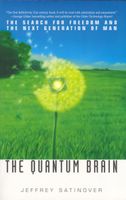
Life, regeneration and the generation of the generations:
A self-replicating machine requires a data storage system which must be accessible or comprehensible to the constructor device. It requires that the constructor be assembled from a very small number of readily available substances. It requires a means of energy gener ation, storage, and distribution to its working components and so forth. None of these problems has been solved [mechanically]. Yet every second, countless trillions of living systems from bacterial cells to elephants replicate themselves on the surface of our planet.(Nature's Destiny: How the Laws of Biology
...it is not just the act of self-replication which has not been copied in our technology. Even the far less ambitious end of component self-assembly which is utilized by every living cell on earth, exhibited in processes as diverse as the assembly of viral capsules to the assembly of cell organelles such as the ribosome, a process whereby tens or hundreds of unique and complex elements combine together, directed entirely by their own intrinsic proper ties without any external intelligent guidance or control, is an achievement without any analogue in modern technology.
The well-known self-reorganizing, self-regenerating capacities of living things have been a source of wonderment since classical times—phenomena such as the growth of a complete tree from a small twig, the regeneration of the limb of a newt, the growth of a complete polyp, or a complex protozoan from tiny fragments of the intact animal. These are all phenomena without analogue in the realm of the mechanical. Imagine a space ship, a computer, or indeed any machine ever conceived, from the fantastic star ships of sci ence fiction to the equally fantastic speculations of nanotechnology, being chopped up randomly into small fragments. Imagine every one of the fragments so produced (no two fragments will ever be the same) assembling it self into a perfect but miniaturized copy of the machine from which it originated. Nature does this constantly. It is an achievement of transcending brilliance which goes beyond the wildest dreams of even the most ardent proponents of artificial life. I doubt there is anyone who has witnessed the regeneration of a protozoan through a microscope who has not been struck with an almost metaphysical awe at the wonder of the process.
Reveal Purpose in the Universe
By Michael Denton :147-148)
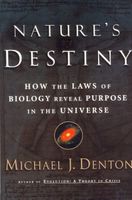
What do those who write the mythological narratives of Naturalism have to say about it?
...an asexual parent sends all its genes to each progeny. In the Darwinian struggle to pass on more of ones genes to future generations, asexuality is twice as efficient as sexuality. It is therefore difficult to explain how sexual reproduction might have become prevalent.
In addition, there are costs beyond the automatic genetic penalties of sex, and these non-genetic costs are large. There is the cost of evolving and maintaining the sex organs. There is the cost of various kinds of incompatibility, such as blood Rkt factor incompatibilities between mother and child. In a sexual organism there are problems of tissue rejection between mother and child. Also, in a male body its own sperm is like foreign tissue, due to its different genetic makeup. Special mechanisms are required to keep the body’s immune defenses from destroying its own sperm. This is also true for females and their eggs. All these problems are avoided in asexual organisms.
In finding a mate, courting, and copulating, a sexual organism will face risks that further place it at a disadvantage relative to an asexual peer. Loud mating calls, scents, extravagant plumage, exotic behavior, flowers and nectar all have their price. They use energy, alert predators, and frequently reduce the non- sexual functioning of the organism.
Evolutionary literature abounds with scenarios explaining how a minuscule increase in a certain trait allows a species to more optimally mate. Theorists are then satisfied they have explained the trait. For example, they offer scenarios to explain the evolution of optimal courting behaviors and even optimal copulation intervals and durations. They deliver intricate explanations of how a male can most optimally insure that his sperm is the one to fertilize a female. They give countless such scenarios, and they are quite serious about it. They seriously believe these have sufficient power to explain the evolution of optimal mating, courting, and copulation.
Yet the power of these scenarios is dwarfed by asexuality, which solves all these problems completely — in one swoop — and in the most optimal possible way. For an asexual organism these problems completely disappear. Asexual reproduction is easily the more efficient solution. Altogether these factors account for a large disadvantage to sex beyond the 50% cost of meiosis. Nonetheless, the literature focuses on the 50% figure as the major cause for concern. Again we must ask, Why is sex so extremely prevalent? Why is it here at all?
[...]
...in an asexual organism, gene combinations are inherited together and are not split apart. Therefore, a favorable gene combination would exert its influence in every descendant, rapidly propelling it to predominance in the population.
...results showed that in most plausible situations, sex is expected to hold back evolution, not accelerate it.[It] has proven difficult to produce explicit models that show that mixis [the genetic mixing caused by sexual reproduction] accelerates adaptive evolution. (Michod and Levin, 1988, p 2)This realization provoked a boldfaced, 180-degree turn-around in the explanation of sex. Now, it was claimed, sex is an advantage not because it hastens evolution, but because it slows evolution. Evolutionary experts have seriously made such claims. This situation was observed and lamented by Bell.To save the situation, then, we must perform a complete volte-face: just as it was self-evident to Weismann, Fisher and Muller that a faster rate of evolution would benefit a population, so we must now contrive to believe in the self-evident desirability of evolving slowly. (Bell, 1982, p 100)[...] Evolutionary theory is so plastic it can accommodate virtually anything. Nothing demonstrates that flexible story-telling like the evolutionists’ attempts to explain sex.
(The Biotic Message
By Walter ReMine :197, 203-204)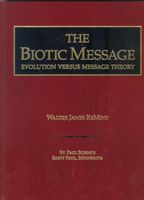
It is rather amusing how stumped the writers of the mythological narratives of Naturalism are on sex. It seems quite appropriate. I am a helpful fellow, so I'll try.
Once upon a time there was an ape-man and he had a rather random sort of random mutation. He felt, "What is this thing, and what is it for?" (Okay...this one can't go anywhere but down. I guess you'll have to think of your own mythological narrative of Naturalism. If you come to believe what you think up, then perhaps we can look into how silly you are for doing so.)
Monday, May 16, 2005
One paragraph...
As to this discussion, various book length topics have been brought up, which is good, yet they will take a lot of dialogue and so on to get into. I should probably get into how improbable the laws of biology and physics are in their being structured to favor life sometime, to actually have a look at the argument that you are rejecting. That way you might see that our pot luck dinner could very easily have been some unlucky poison given any number of circumstances. It's a little different than, "...a bunch of variables got mixed together, and what happened happened." Anyone interested can read Nature's Destiny: How the Laws of Biology Reveal Purpose in Nature, by Michael Denton, because I may not get to many things that should be written on.
In the discoveries of science the harmony of the spheres is also now the harmony of life. And as the eerie illumination of science penetrates ever more deeply into the order of nature, the cosmos appears increasingly to be a vast system finely tuned to generate life and organisms of biology very similar, perhaps identical, to ourselves. All the evidence available in the biological sciences supports the core proposition of traditional natural theology——that the cosmos is a specially designed whole with life and mankind as its final goal and purpose, a whole in which all facets of reality, from the size of galaxies to the thermal capacity of water, have their meaning and explanation in this central fact.
Four centuries after the scientific revolution apparently destroyed irretrievably man’s special place in the universe, banished Aristotle, and rendered teleological speculation obsolete, the relentless stream of discovery has turned dramatically in favor of teleology and design, and the doctrine of the microcosm is reborn. As I hope the evidence presented in this book has shown, science, which has been for centuries the great ally of atheism and skepticism, has become at last, in these final days of the second millennium, what Newton and many of its early advocates had so fervently ished—the “defender of the anthropocentric faith.”
(Nature's Destiny: How the Laws of Biology
Reveal Purpose in the Universe
By Michael Denton :389)

Unfortunately, that is the teleological conclusion sans the hundreds of pages of evidence. But moving on anyway....
This morning David said,
"Why does man leap to the coclusion that whatever controls everything else that you cannot control by your own choices is anything like man?"
We know from experience that a creator leaves their imprint on that which they create. Even if they do not want to they do, we know from experience that there are tell tale signs of design. Therefore it is not much of a "leap" to note that the Creator has left evidence or artifacts as to what they are like and given the apparent anthroprocentric nature of Nature it may be that their likeness is most likely to be found in man. Of course, the Bible states this directly. I've noticed that for some lack of reason mentioning the Bible seems to make the New Man want to run around screaming his head off. Or it seems to result in a conditioned sort of response of some type based on negative emotional conditioning.
I would note that in some of your writings you have relied on a view of science as ever advancing against religion. That sort of pattern is historically inaccurate. You also seem to be including all sorts of knowledge in "science." It is as if you think that all true knowledge or understanding of the natural world has come through science. That is false. You also invoke the flat earth and so on, as if scientists came to the conclusion that the earth is round and with steely eyed determination had to battle the religious people of their day. That is false. These sort of memes that seem to be lurking in the background of your position need to be corrected or at least stirred. Generally, the opposition of religion and science that American professors often set up and Hitler's professors appealed to in similar ways is false.
For instance, just because Galileo came into a disagreement with clergy does not mean he agreed with Naturalism.
"The holy Bible and the phenomena of nature proceed alike from the divine Word."
Galileo Galilei, Laws of Dynamics,
astronomical confirmation of the heliocentric system
cf.
(The Wonder of the World: A Journey from
Modern Science to the Mind of God
by Roy Abraham Varghese :103)
I am reminded of the way that some Leftist atheists and agnostics distort the writings of the Founders based on their disagreements with clergy as well. It seems to me that someone could come along later and just as easily distort my entire philosophy by focusing on an attack on televangelists or prissy Christians by me. Then they would also argue something about how, "Well, almost everyone in America in 2005 were Christians and he was just following along and didn't know any better, a victim of his times. So as you can see as he called most preachers 'pansies' he would obviously agree with modern agnosticism." These types of arguments are just as incorrect when applied to the Founders. They were not just the helpless victims of their times and the supposed ignorance of such times. They knew of essentially all the same philosophies that surround us today. It is their type of philosophy that is still sound, timeless and yet timely because it is based on the metaphysical, the spiritual by another name. That does not change with time. It ought to also be noted that the advancing knowledge of the physical has come to support their views. It seems that those who have a sound and systematic knowledge of the metaphysical often have timeless and timely views on things that are sometimes confirmed later as knowledge of the physical advances.
The Founders wrote anti-evolutionist and so anti-fascist ideas into our founding documents, as their focus was metaphysical over of physical. For instance, the Republic is based on a belief in elected representation over hereditary leadership through the consent of the governed over monarchy, separation of powers over consolidation and republicanism over democracy. The foundational belief which laid out the end that government was to be a means to was a belief in theistic origins and consequent transcendent self-evident truths, evident in the Self itself. The metaphysical focus on a text and blueprint for the nation is the same type of focus that overlooks nationalism based on tribe and physical characteristics and instead focuses on ideas, ideas come to be patterns of ideas such as "the American dream."
They based their system on text, with the text being designed to be able to adapt to the needs of the body politic. Of course, unfortunately the textual degenerates of the Judiciary have now begun rule based on their own judicial diktats and their mutations are quite random. Those who agree with their sort of textually degenerate philosophy, the evolutionists, have developed quite an alliance with them. Perhaps they can come together to throw the Constitution on the floor and stomp on it to see what text Nature selects and supposedly writes for them next. Yet no, instead the existentialist will write whatever they will. For they still believe in choice and the will, although they have no basis to do so.
"The concept of a design suggests that someone had this particular outcome in mind. It seems to me the other way around, that something was set in motion and this is just what happened."
It seems to me the other way around. Did you have that particular sentence in mind and then think through your brain to set a chain of events in motion or was it just what happened to happen? That sentence is, after all, far less complex and specified than the laws of Nature. It is not clear why you would have people read it as if it is an artifact of your mind, as you will not read the laws of Nature as an artifact of the Mind of God. That is a matter of your will, not how the evidence actually reads.
"I don't think there was any planning. (If there was, the planner has a sick sense of humor and/or a terrible aesthetic. He needs an episode of Queer Eye for the Onmipotent."
Hmmm....it is probably good that this paragraph is coming to an end. Do you want to go into such topics? Why do you feel that self-defined Gays© have a higher aesthetic sense? Do they? They have a lot of influence in the fashion world. There the Queer Eye seems to want to see the feminine starve, just how queer is the Queer Eye? Is its effete aesthetic sense better or must it constantly look in the mirror, always seeking and never finding?
"Did someone create the variables. Did someone come up with the law of Gravity, and Inertia, and that you never find a parking spot when you are late for a meeting? Did someone invent them. I don't know. Does it matter? I can't see why. Does its presence or abscence excuse us from behaving ethically? I don't believe so."
The writing in this paragraph seems appropriate.
"I don't think...."
"I don't know."
"I can't see...."
"I don't believe..."
It seems I can take you at your words.
There is a pattern of thought that might be drawn out once you begin to write what you do think you are thinking. I think there might be a thought pattern to it.
So ends that paragraph....
At another point you said,
"This designer you speak of, who created DNA and the human brain, and rainbows... trying to prove its existence by comparing it with what humans are capable of... I call it poor logic, and don't you call it blaspheming?"
I'm curious, what did you think you were thinking when you brought up blasphemy there?
Sunday, May 15, 2005
A Deist answers typical inversions of Naturalism
And when the atheist descanted on the unceasing motion and circulation of matter thro' the animal vegetable and mineral kingdoms, never resting, never annihilated, always changing form, and under all forms gifted with the power of reproduction; the Theist pointing `to the heavens above, and to the earth beneath, and to the waters under the earth,'asked if these did not proclaim a first cause, possessing intelligence and power; power in the production, and intelligence in the design and constant preservation of the system; urged the palpable existence of final causes, that the eye was made to see, and the ear to hear, and not that we see because we have eyes, and hear because we have ears; an answer obvious to the senses, as that of walking across the room was to the philosopher demonstrating the nonexistence of motion.
Thomas Jefferson
(The Faiths of Our Fathers: What America's
Founders Really Believed
By Alf J. Mapp :14)
The typical atheist argues that no matter the improbability (actually mythologically narratives of Naturalism can be defined as an impossiblity according to probability analysis) we happen to have "won the particular lottery favorable to life" because otherwise we wouldn't be here and living to see we had won. As Jefferson notes, that is an inversion of causes with respect to seeing. The fact that we are living and seeing currently did not cause anything to happen back in the time of origins. Seeing now has no causative force and there is no reason to argue that anything was "because" we are here to see it now. It's rather like arguing after you win the lottery that "because" you won the lottery, you didn't need the winning ticket. (Another way of noting this inversion is the story of the Nazi sharpshooters.)
I understand perfectly well that the Naturalist, atheist, agnostic or what have you is trying to say, "Look, if it all hadn't been just so and favorable to life then we wouldn't even be here! So it all seems to be set just so, because if it was not we would not be here."
This, "...we would not be here." lacks force and any real explanatory power. Soon enough, most of us will not be here to observe anything as we will be dead, yet the numerous conditions favorable to life that are physically impossible to account for in Naturalism will most likely remain, regardless. Observation by sentient beings of the numerous conditions apparently set very specifically to favor the existence of intelligent life in Nature has nil to do with their cause or their continued preservation in the system and laws of Nature.
Saturday, May 14, 2005
That figures.
U.S. Border Patrol agents have been ordered not to arrest illegal aliens along the section of the Arizona border where protesters patrolled last month because an increase in apprehensions there would prove the effectiveness of Minuteman volunteers, The Washington Times has learned. (Read More)
It's global warming, so get out your ear muffs.
The New York Times; Nov. 11, 1956, pg. 40)
WASHINGTON, Nov. 10 (AP)
New findings of "atomic timekeeping" suggest that North America may be headed into another major Ice Age, a Government geologist said today.

(Frozen Key to Our Climate
By Leonard Engel
The New York Times; Dec 7, 1958, pg. SM72)
...Lately, conspicuous changes have taken place in some of the ice. Glaciers in the western United States, for example, have lost 50 per cent of their ice in seventy years. The floating ice of the Arctic is one-third thinner and covers a considerably smaller area than it did sixty years ago.
Such changes imply that the world is becoming warmer. But no one is sure of the extent of these changes. ...new research suggests that the melting of the Arctic's floating ice may have the paradoxical effect of bringing, in perhaps as little as several hundred years, the start of a new Ice Age.

(Science, Worrying About a New Ice Age
By Walter Sullivan
The New York Times; Feb 23, 1969, pg. E10)

(Scientists Ask Why World Climate Is Changing: Major Cooling May Be Ahead
By Walter Sullivan
The New York Times; May 21, 1975, pg. 45)
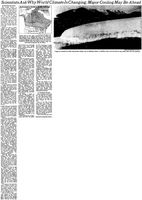
(New Ice Age by 1995?
By Larry Ephron
The New York Times; Jul. 1988, pg. A16)

(Scientists Suggest Global Warming
Could Hasten the Next Ice Age
By William K. Stevens
The New York Times; Jan. 21, 1992 pg. C4)

That's the basic pattern of the paradoxical story of global warming over the last fifty years. The year of 1995 came and went, still no New Ice Age...so does that falsify the predications? It would be nice if more of this story telling were testable.
Some of the science dealing with global warming is flirting with scientism. It has some of the signs of it where it intersects with politics and so personal biases. Some of where this sort of story telling falls into scientism is where it is not falsifiable, not testable by any empirical observations. There is a warm summer and that's said to be because of global warming. There is a cold summer and that's said to be because of global warming too. If you are going to make a global claim, stick with global evidence.
I am just a simple fellow and I am with the scientist when they have a grand cause for a grand effect such as solar spots and volcanic eruptions, vast observable forces of Nature causing cooling and warming on vast scales. I am with them even when they argue paradoxical things about global warming bringing about an Ice Age when they have the empirical evidence for such claims. Yet when they or science thumpers begin to argue based on their own politics that something as puny as people driving SUVs around is causing something on a global and nearly Cosmic scale, then I note that grand claims need grand evidence. Sometimes it seems that some people just want to make grand prophetic claims and claim it is all scientific. Besides, wasn't it a butterfly flapping its wings in the forest that caused storms, which caused the Ice Age?
As Einstein argued, humility is the scientist's greatest virtue. That is what is lost in scientism.
Friday, May 13, 2005
The Soul Doctors
If you have been robbed, do not complain either to the policeman or to the psychologist: the policeman is not interested; and the psychologist is interested only in proving that you are not the victim but the thief.(Anti-Freud: Karl Kraus's Criticism of Psychoanalysis and Psychiatry, By Thomas Szasz)
__
Psychologists: unmaskers of the insignificant, swindlers of the significant.
__
Modern psychologists have greatly enlarged the frontiers of irresponsibility: they needed more space in this territory.
__
My unconscious knows more about the consciousness of the psychologist than his consciousness knows about my unconscious.
__
Psychology is the most powerful religion: it turns doubt into bliss. As weakness engenders not humility but arrogance, this new doctrine enjoys great earthly success and lords over all other creeds and cults.
__
The new science of mad-doctoring has dared to invade the mystery of genius. ....I will stand watch and personally consign these manufacturers of madness-whose cry, 'Anything to treat?' is now heard all over the land-into oblivion. Their teaching enlarges irresponsibility and thus diminishes the personality.
__
If mankind, with all its repulsive faults, is an organism, then the psychoanalyst is its excrement. Psychoanalysis is an occupation in whose very name "psyche" and "anus" are united. Its practitioners are divided into separate sects, each with its own Journal, each representing its own distinctive, and yet typically psychoanalytic, doctrine of destroying God, disgracing Nature, and demeaning Art.
__
Despite its deceptive terminology, psychoanalysis is not a science but a religion-the faith of a generation incapable of any other.

Wednesday, May 11, 2005
A reply to David...
"...this blogging thing is quite addictive.... maybe it is a mental illness... Wait, lucky for me, mental illness does not actually exist."
That's correct, as how can an illness be mental? Brain illness on the other hand does exist...so maybe it is a brain illness. Did you notice how I borrowed your neural nets by setting some patterns of thought against each other?
"Probability, that's just a concept that almost doesn't even exist."
"Infinity, the tension between that concept and reality explains all life!"
Once they are woven against each other, then you begin to answer yourself and I just borrow your own answers. It's easier that way. (Hmmm, it must be my lazy orientation. You see, I was born this way. Eventually, I had to come out of the closet as a lazy person. For I was living a lie...a lie, I tell you! Lazy rights!)
You still want to stick with minimizing probability,
"Whatever the statistic is, we hit that particular lottery."
So how about a story about minimizing probability....it's one I remember from somewhere.
Once upon a time in WWII an Allied spy was captured by the Nazis and he was to be shot to death by a firing squad of Nazi sharp shooters. So they put him against a wall, aimed their guns and fired. Yet not a single bullet hit the airman and instead the bullets formed an outline on the wall. The airman looked at the outline on the wall and said, "Wow...what are the chances?! Well, whatever the chances are it is obvious that I hit the particular lottery that favors my life. Because....I'm here, and that's the only way I can see the outline on the wall. If I was shot, then I wouldn't be here to see that I hit the lottery. Chance be praised!"
But actually, all the sharp shooters were spies themselves working from within the Nazi army who had gotten themselves assigned to this specific firing squad specifically to save the life of the airman. So they just looked at the airman until he said, "Oh, righto, thanks fellas..." Then he was thankful that circumstances had been shaped to favor his life, as he should have been all along.
"I object to a bogus use of probability to create a theory about the nature of the universe. ID theory seems to center around the idea that things are so complex someone must of has designed it. I can't make that leap."
What are the chances of your sentence...
Your sentence seems to center around the notion of your own sentience, as sentences typically do. Yet what is that? Is it scientific? Is it matter, does it matter? Shall I assume that your sentence is an artifact of the design, symbols and signs written by your mind? How shall I, and what are the chances that it is designed? Perhaps I should look to Nature first and argue that Nature selected the complexity and specifications of your sentence? Perhaps...I won't make the leap out of Nature either. Instead I will sit in her womb with you to keep you company down here in Plato's cave. And that's pretty nice of me! Let's not make any leaps in here, instead we'll keep things all gradual like.
Moving on...I'll type this slowly.
Dave Thomas says, "Frosties are free this weekend!" Just kidding. I think they actuallly are. It was that whole finger food incident. But another Dave Thomas says,
"The real "fog" in this debate is Biotic Message Theory, which explains all commonalities as evidence of the work of a single designer, and all differences as evidence of this designer's creativity. No observation could fail to fit this theory."
That's false. Those with the urge to merge know well enough that if empirical observations of Nature did not reveal typology over and over again, then their mythological narratives of Naturalism would fit sans vast leaps of imagination. I'd hate to see what they could do with a real pattern of evidence that fit sequence. Sequence is the sort of observation which would refute Biotic Message Theory. But instead message theory fits the evidence and the commonalities are types....such as DNA, which all life uses to store information, while there is a vast chasm between life and non-life. Empirical observations of Nature also illustrate that diversity is also made up of types, scales are found to be scales and feathers are feathers and so on. The pattern that is found is not one of sequence or Darwin's "infinitude" of intermediaries for each structure, i.e. the sort of feather...yet still part scale.
And note, the commonality of the type in DNA surpasses any form of information storage that we have yet designed.
So efficient is the mechanism of information storage and so elegant the mechanism of duplication of this remarkable molecule that it is hard to escape the feeling that the DNA molecule may be the one and only perfect solution to the twin problems of information storage and duplication for self-replicating automata.(Evolution: A Theory in Crisis
....
It is astonishing to think that this remarkable piece of machinery, which possesses the ultimate capacity to construct every living thing that ever existed on Earth, from a giant redwood to the human brain, can construct all its own components in a matter of minutes and weigh less than 10^16 grams. It is of the order of several thousand million million times smaller than the smallest piece of functional machinery ever constructed by man.
By Michael Denton :337-338)
"Do you have a zinger I haven't seen yet?"
Are you going to be passive and have me zing your mind to see if it will sing? You can if you want. I thought you might want to try convincing me though.
Let's have a look at the main argument in plain english, "Things reproduce and stuff...and because they reproduce a lot, some live and some die. The ones that live might be slightly different than their ancestors. All these differences caused by some dying and some living can be added up over time until we come to structures like our human brains with 100 billion neurons and its visual system that computes the bioelectric signals, blurs them, fills in the blind spot, and so on. Ultimately, that's how you can read this. So it is a good thing that long ago, some apes didn't have enough bannas to eat but kept getting it on or otherwise we might not be here to talk about it. It must be that the more that things reproduce and starve and die, then the more they evolve. After all, it all had to be so or we wouldn't be here. "
Often, the main argument is soon to be followed with, "So you punched a hole in the theory of evolution. That doesn't matter. It's scientific or somethin', so disagreein' with me is just like disagreein' with gravity! "
And so on. Perhaps you have a zinger for me? I leave it to you. I meant to write something or other yesterday but I had a cold. And I didn't get around to reading the dialogue between ReMine and Dave Thomas either, perhaps we can write our own instead. I still need to polish up a misunderstanding about natural harmony. Perhaps another day...
Tuesday, May 10, 2005
Our MTVeee generation at the UofDeee
His lawyers may argue that he was not mentally competent enough to understand that it was a quiz as the result of all his UofDeee binge drinking.
Student said to mumble, "Me not know..."
Monday, May 09, 2005
The Nazis and Science
(The Nordic Pagan Chant Grows Louder
By Albion Rossberlin
The New York Times, Aug 4, 1935; pg. 3-4)
It seems that some people may tend to know the Mind of God better than others. Here are two stories to compare Nazi scientism with scientia, an open pursuit of knowledge to those of a mind to try to seek and find.
(Praises Nazi Scientists
The New York Times
July 10, 1943, pg. 3)

This praise for Hitler's professors stands in contrast to actual results. Those who believe in scientism seem to use science as a mask for systems of belief that are rather like some ancient forms of Nature based paganism. Ironically, they seem to believe that if America continues to be one of the most religious nations on earth, then it will be a failure when it comes to science and technology. (As if it has been such a failure?)
Who fails, and who succeeds...


[snipped]
(Report by Britain
By Clifton Daniel
The New York Times
August 7, 1945 pg. 1)
Eugenics and the science thumpers...
Some trends I noted,
The contention that ‘relative class differences in early mortality rates do not reflect class differences in environment' has re-emerged, as also has the investigation of the social class distribution of gene pools.’ The revitalized debate about the heritability of IQ is well-known (see Rose’ Rose et al.’ the invention of sociobiology also returns the discussion of the dominance of biological factors to an earlier mode.’ Within the natural sciences a new genetics is being bred, which, like its parents, limits the trail of individual differences to their supposed source in the gene — in the time of the founder of eugenics, Francis Galton, an abstract concept, but now one with a definable chemical meaning. Recent scientific work in the domain of reproduction holds up a new vision of the scientific control of the quality of life which would have warmed the hearts of the early eugenists, and, like their earlier visions, unceremoniously disregards the ethical concerns of ordinary people, including women as the major recipients of repro ductive techniques (see Corea)
At the same time as these developments have occurred, the intellectual and practical activity of sociological research on health is being cut back. The medicine of the social, evolved into a sociology of the medical (and importantly also of health) is the victim of several related trends, including the ideological and financial investment in ‘pure’ science....
(Eugenics, Social Medicine and the
Career of Richard Titmuss in Britain 1935-50
By Ann Oakley
The British Journal of Sociology
Vol. 42, No. 2 (Jun., 1991), pp. 189)

I agree with Chesteron's summaries of those who subtley come to venerate science and so to believe in the scientism of their day, from phrenology to the modern mythological narratives of Naturalism. His first summary is a description of the average science thumper and it is apt:
Most Eugenists are Euphemists. I mean merely that short words startle them, while long words soothe them. And they are utterly incapable of translating the one into the other, however obviously they mean the same thing. Say to them “The persuasive and even coercive powers of the citizen should enable him to make sure that the burden of longevity in the previous generation does not become disproportionate and intolerable, especially to the females”; say this to them and they will sway slightly to and fro like babies sent to sleep in cradles. Say to them “Murder your mother,” and they sit up quite suddenly. Yet the two sentences, in cold logic, are exactly the same.(Eugenics and Other Evils: An Argument
....I will refer to two actual cases from the Eugenic discussions. When Sir Oliver Lodge spoke of the methods “of the studfarm” many Eugenists exclaimed against the crudity of the suggestion. Yet long before that one of the ablest champions in the other interest had written “What nonsense this education is! Who could educate a racehorse or a greyhound?” Which most certainly either means nothing, or the human studfarm. Or again, when I spoke of people “being married forcibly by the police,” another distinguished Eugenist almost achieved high spirits in his hearty assurance that no such thing had ever come into their heads, Yet a few days after I saw a Eugenist Pronouncement, to the effect that the State ought extend its Powers in this area. The State can only be that corporation which men permit to employ compulsion; and this area can only be the area of sexual selection. I mean somewhat more than an idle jest when I say that the policeman will generally be found in that area. But I willingly admit that the policeman who looks after weddings will be like the policeman who looks after wedding-presents. He will be in plain clothes. I do not mean that a man in blue with a helmet will drag the bride and bridegroom to the altar. I do mean that nobody that man in blue is told to arrest will even dare to come near the church.
Against the Scientifically Organized Society
By G.K. Chesterton
(With Additional Articles by his
Eugenic and Birth Control Opponents
Edited by Michael W. Perry :19-20)
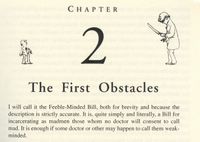
(Quote by a Eugenicist)
Sunday, May 08, 2005
The Extracosmosials ;-)
One thing they would do would be to use the evil of the evil transphysical being for good. It was enraged at first, to have its power limited so. It wanted to go back to the way things once were. Yet it would not agree make restitution for the destruction it had caused. For to create was a lot of work and would make it weaker, and so it would not surrender. There was still a war although it went rather cold and the conflict was not as open as the second being and its followers tried to negotiate with the first. They asked if they surrendered to the will of the first, why couldn't they go back to the way things once were? Yet that was not surrendering to the will of the first as what the will of the first was, was that they make restitution. This was one of the messages of the system that represented messages to them. There was cause and effect. They could not have something for nothing as they wanted now. It would have to be created, and all creation cost a creator something.
The creative being had set up a garden where there would be a process of death and life, the degenerative being used for the creative. At first Evil allowed itself to be used and turned to Good in the system of cause and effect in the new world. And so it was good again. So the creative being gardened the garden and the message was repeated over and over that evil and death could and would be turned to life, and the place teemed with life. The pattern was represented by the plants of the place, the death of which all other life could live on.
Then the creative being created some life after its own pattern. It even put its own sort of being into the life that was meant to continue to tend to the garden and to ultimately subdue the whole planet. This caused a second war.
At first the second being tried to negotiate and argued to the first that this was just too much, yet the hatred it held toward the first began to be brought out. For it still hated the creative pattern of the first, as it was still a contingent being and could not have the same power. And now, was a portion of the very thing it had fought to grasp for itself to be given to these bits of the earth on its world? This was not a message to be learned, this was just vindictive! This was its own world, wasn't it? The repeating message was for it. It was the evil pattern being turned to Life, so it was the Good! This was enough, what was this about more and more submission to bits of this system?
It had the knowledge of both Good and its own Evil and the Good could not say the same. It thought that there must be a way to use its knowledge. And so it told itself that equality with the first being was still something that it could have.
Then it broke the rules of the world in order to destroy the messengers and the message. It was tired of seeing it.
Index I
Index II
Index III
Not indexed yet,
Science Fiction
Skepticism is allowed, in theory...
"To argue that skepticism about the theory of evolution is inadmissible if it is motivated by religion is simply a form of antireligious bigotry. It is a fact that many devout Christians, many of whom are engaged in the relevant sciences, subscribe to the theory of evolution. It is also a fact that some scientists who reject religion also reject evolution, or think the theory highly dubious. (E.g., Michael Denton) That is the way it is with theories.(Read more)
Theories are proposed principles or narratives that are both arrived at and tested by their explanatory force relative to what are taken to be known facts. To simply equate evolutionary theory with science is a form of dogmatism that has no place in the pursuit of truth. The problems with that approach are multiplied by the fact that there are such starkly conflicting versions of what is meant by evolution. The resistance to the theory is almost inevitable when it is propounded, as it often is, in an atheistic and materialistic form. Atheism and materialism are not science but ideologies that most people of all times and places, not just "red state" Americans, deem to be false. Proponents of "intelligent design" and other approaches, who are frequently well-certified scientists, contend that their theories possess greater explanatory power."
(Stifling Intellectual Inquiry
By Richard John Neuhaus
First Things
April 30, 2005)
Saturday, May 07, 2005
Windsurfing
Maybe there are just too many science thumpers. Like most thumpers, they don't seem to know what they're thumping. So it's time to give their minds a thumping.
Well, it was great. 30-35mph winds in the morning, I was on a 4.0 (sized sail) then. It steadily decreased all day (4.6 sail to 5.0 to 6.6), until it was like a lake in the evening. (time for dinner!)
Later.
Thursday, May 05, 2005
The MTVeee generation...
But here is a Jeremiad for us, so see what you think. More and more as culture is failing to be cultivated by civilization and instead is growing more weeds the decline of civlization cannot be denied. The American Republic is slowly going the way of the Weimar. The process speeds up at the end and then the bubble must burst, as that is what bubbles do. If the people have the moral fiber to deal with it then a decadent civilization may rise higher than one might think. But it is different when there is only a gluttonous, wicked and adulterous generation left when the bubble bursts. Money can paper over the consequences of a multitude of evils, so put more copper in the coin as the Roman Republic did, more! It is interesting that such decline can be and is predicted from the very top well in advance, from the ideas of the thinkers. These are the nice people, pretty much all of them are nice, who work with beautiful ideas that kill when words become bullets. As there is no money to paper things over.
A Jeremiad for we, the MTVeee generation:
"Nietzsche, particularly, sought to tap again the irrational sources of vitality, to replenish our dried-up stream from barbaric sources, and thus encouraged the Dionysian and the music derivative from it.(The Closing of the American Mind, By Alan Bloom :73-74)
This is the significance of rock music. I do not suggest that it has any high intellectual sources. But it has risen to its current heights in the education of the young on the ashes of classical music, and in an atmosphere in which there is no intellectual resistance to attempts to tap the rawest passions. Modern-day rationalists, such as economists, are indifferent to it and what it represents. The irrationalists are all for it. There is no need to fear that “the blond beasts” are going to come forth from the bland souls of our adolescents. But rock music has one appeal only, a barbaric appeal, to sexual desire—not love, not eros, but sexual desire undeveloped and untutored. It acknowledges the first emanations of children’s emerging sensuality and addresses them seriously, eliciting them and legitimating them, not as little sprouts that must be carefully tended in order to grow into gorgeous flowers, but as the real thing. Rock gives children, on a silver platter, with all the public authority of the entertainment industry everything their parents always used to tell them they had to wait for until they grew up and would understand later.
Young people know that rock has the beat of sexual intercourse. ....In alliance with some real art and a lot of pseudo-art, an enormous industry cultivates the taste for the orgiastic state of feeling connected with sex, providing a constant flood of fresh material for voracious appetites. Never was there an art form directed so exclusively to children.
Ministering to and according with the arousing and cathartic music, the lyrics celebrate puppy love as well as polymorphous attractions, and fortify them against traditional ridicule and shame. The words implicitly and explicitly describe bodily acts that satisfy sexual desire and treat them as its only natural and routine culmination for children who do not yet have the slightest imagination of love, marriage or family. This has a much more powerful effect than does pornography on youngsters, who have no need to watch others do grossly what they can so easily do themselves. Voyeurism is for old perverts; active sexual relations are for the young. All they need is encouragement.
The inevitable corollary of such sexual interest is rebellion against the parental authority that represses it. Selfishness thus becomes indignation and then transforms itself into morality. The sexual revolution must overthrow all the forces of domination, the enemies of nature and happi ness. From love comes hate, masquerading as social reform. A worldview is balanced on the sexual fulcrum. What were once unconscious or half-conscious childish resentments become the new Scripture. And then comes the longing for the classless, prejudice-free, conflictiess, universal society that necessarily results from liberated consciousness "We Are the World," a pubescent version of Alle Menscizen werden Brüder, the fulfillment of which has been inhibited by the political equivalents of Mom and Dad. These are the three great lyrical themes: sex, hate and a smarmy, hypocritical version of brotherly love. Such polluted sources issue in a muddy stream where only monsters can swim. A glance at the videos that project images on the wall of Plato’s cave since MTV took it over suffices to prove this. Hitler’s image recurs frequently enough in exciting contexts to give one pause. Nothing noble, sublime, profound, delicate, tasteful or even decent can find a place in such tableaux. There is room only for the intense, changing, crude and immediate, which Tocqueville warned us would be the character of democratic art, combined with a pervasiveness, importance and content beyond Tocqueville’s wildest imagination."

"We Are the World." Wasn't that Michael Jackson's sort of anthem?
I have some different thoughts on rock music than the attack layed out above. And come to think of it, I may write about it later. But for now here is some news from the Continent, as they have rather thoroughly refused the lessons of the Weimar Republic and civilizations throughout history. Those who judge judgment, quite simply refuse to repent. How they judge, lest they be judged!
(Sunday Mirror
May 1, 2005, Sunday
SECTION: 3 Star Edition; NEWS; Pg. 21
HEADLINE: I'M A DAISY-CHAINER: WE DID IT
IN A RUSH WITHOUT A CONDOM.. THEN GIRLS SWAPPED AROUND;
BOY, 15, REVEALS TRUTH OF TEEN SEX CRAZE
BYLINE: EXCLUSIVE BY DENNIS ELLAM)
"IT started in the porn industry. That most innocent of images - daisy-chaining - became warped to mean an orgy with lots of partners pleasuring each other at the same time.And the parents are shocked, just shocked! What did they expect with their Millian, "You can do whatever you can get away with doing without causing harm." sort of standards?
But its meaning has changed again - and this time around it will horrify every parent in the country.
Daisy-chaining now describes sleazy, drink-fuelled orgies in which TEENAGERS indulge in group sex.
The craze has shocked experts already concerned about the rising levels of sexual disease among youngsters.
Last week nurses raised the worrying trend at the Royal College of Nursing's annual conference in Harrogate, North Yorkshire.
The same conference also heard how a British boy aged only 14 had contracted HIV through sexual intercourse.
....
"I only started out of curiosity, because I thought everybody else was having sex except me as I was still a virgin at the time," he said. ...."
(The Express
May 2, 2005
SECTION: U.K. 1st Edition; LEADER; Pg. 12
HEADLINE: IN A SOCIETY OBSESSED WITH SEX,
NO WONDER TEENAGERS HAVE ORGIES; LEADER - THE MONDAY COLUMN
BYLINE: By Virginia Blackburn)
"ARE THERE no taboos left? For even in a world in which nothing seems to raise eyebrows any more, this was a shocking revelation. Last week, at the Royal College of Nursing's conference in Harrogate, school nurses warned that increasing numbers of teenagers are taking part in an activity known as "daisy chaining" - group sex.
....
If one were to ask for a snapshot of what is wrong with our society today, it would be impossible to better that. For, even allowing for some exaggeration, it is clear we are seeing an increase in sexual activity among the young as never before: in February, figures released by the Department of Health revealed that in 2003, 1,171 girls aged 14 and under had abortions.
That is a rise of eight percent in 12 months, showing the Government pledge to halve pregnancy rates among the under-18s by 2010 to be risible. Over the past seven years, the Teenage Pregnancy Strategy has used £138 million of taxpayers' money to try to reduce the rates of teen pregnancy by, among other measures, making the morningafter pill, condoms and sex "education" (for which read "advice") more readily available.
Had that strategy paid any dividends at all, it would have been worth every penny: as it is, not only has it done nothing to bring down teen pregnancies but it has encouraged some forms of sexual activity in which most adults would not dream of taking part.
Group sex? Among children? Thirty years ago, this would have been so unlikely as to be treated as a joke in extremely poor taste.
But this crisis in our midst must be laid at many more doors than the Government's: it is a by-product of the world we live in today.
To return to that comparison with swinging: a few years ago, swinging and sex parties were virtually unheard of. Now they are everywhere, with participants not only admitting to their dubious adventures but speaking of having sex with anonymous partners as a "lifestyle choice" on a par with taking up golf. Is it any wonder children hear about these exploits and decide that they want to try this exciting new activity, too?
Everywhere, youngsters are bombarded with the message that in order to be cool, it is imperative to have sex. Teen magazines are some of the worst offenders: while piously proclaiming that everyone should have the right to say "no", they are still sending out the message that sex is the be-all and end-all of life. The current issue of Bliss magazine, for example, tells the story of one girl's "sordid sex secret" - aged 16, she was videoed having sex with a group of soldiers - as well as providing an A-Z of sex that includes, among much else, the term "yo yo knickers". This, explains Bliss, is an unkind term for a girl who sleeps around: to combat this, it recommends readers to find a boyfriend they can trust.
.....
Of course, teenage magazines are far from being the only offenders: sexual imagery aimed at children is rife. Three years ago Argos was criticised for launching a range of underwear for girls as young as nine, which included G-strings and padded bras. Just last month Asda was forced to remove pink and black lace underwear sets for nine-year-olds.
French Connection has for years used a slogan that is too vulgar to merit repetition here and sold T-shirts bearing that slogan to young children.
It's not just clothes. Even the humble Pot Noodle, possibly the least erotic foodstuff on the planet, has had its image sexed up to appeal to the youth vote, with the tagline "hurt me, you slag" in one ad. After complaints, the advertisement was withdrawn.
Sexual imagery now filters down to the people who are most vulnerable and least equipped to deal with it in society. It is a shocking betrayal of our children to encourage sexual activity so young: quite apart from the emotional havoc it wreaks among both sexes, the physical damage can last a lifetime.
Sexually transmitted diseases are rocketing among the young: between 1999 to 2002, incidents of gonorrhoea tripled in boys aged 13 to 19, while chlamydia, which can cause infertility in women, quadrupled.
As far as girls are concerned, quite apart from the danger of STDs, it has been known for years that the younger a girl is when she starts having sex, and the greater the number of her partners, both increase her risk of developing cervical cancer.
Yet still we dole out condoms and morningafter pills and fail to press home the message that sex at a very young age will do our children long-term harm.
Indeed, to suggest that children should be given some moral guidance as to when they first have sex and with whom is, in some quarters, enough to invite accusations of prudery and a wish to return to the reigning morality of the Fifties. It is nothing of the sort. There is nothing prim about saying that children should not have sex, and nor should they be encouraged to do so, subliminally or otherwise.
...."
There are not enough people to write good Jeremiads. And I don't know if you noticed but most American preachers are pansies. They have tamed tongues, lame tongues. How nice!
Unfortunately the inversions typical to moral degeneracy echo out in many ways, even to the development of the totalitarian State. The State is not checked by a weakened Church, a weak Conscience to the Body politic, as the same thing happens on an individual level. "Control communicates care and devotion to children, condescension and disdain to adults. Herein lies a fundamental dilemma of society: It ought to encourage parents to love and control their children, and politicians to respect their fellow citizens and leave them alone.
Modern societies are well on their way to inverting this arrangement: They encourage parents to fake respect for their children and thus justify their failure to control them; and politicians to fake love for their fellow citizens and thus justify their efforts to exercise capricious control over them."
(The Untamed Tongue: A Dissenting Dictionary
by Thomas Szasz (emphasis mine) :1-2)

On a similar MTVeee generation note...apparently Britney Spears has her own T.V. show now. Yay! She challenges people in her ad, "Can you handle my truth?" Yes, Britney, I think it just might be possible to handle, maybe. But perhaps she cannot handle the truth about her truth, no more than the brazen laugh of a prostitute hides the fact that sometimes she cries herself to sleep in the dark. She uses her body to sell her soul.
It seems to be the sort of direction that the MTVeee generation may be going. Only those who have the eyes to see, to get above the "cult"ure and look down on it, shall see if it does. And then perhaps someone can write some Jeremiads about it.



